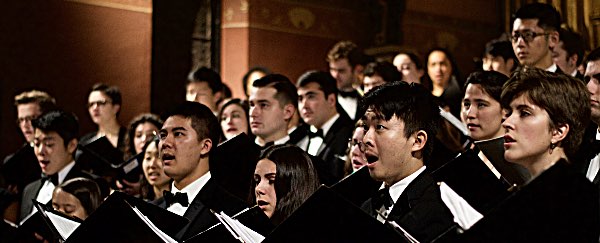- By Cornell University
- Entertainment
 Print
Print  Photo by Savanna Lim
Photo by Savanna LimFor the first time in more than 60 years, the music of J. S. Bach's St. Matthew Passion will fill Cornell's Bailey Hall. The masterwork performance will utilize the combined talents of the Cornell University Glee Club and Chorus, orchestral musicians from NYS Baroque, and six internationally-renowned vocal soloists, including tenor Rufus Müller, who is regarded in the press as one of the world's finest interpreters of the Evangelist role. Additional soloists are Melissa Attebury, mezzo-soprano; Lucy Fitz Gibbon, soprano; Dann Coakwell, tenor; Marc Webster, bass; and Matt Boehler, bass. The concert takes place Saturday, May 5 at 7:30pm.
Written in 1727, the St. Matthew Passion was intended to present the Passion story through music at Good Friday church services, and it continues to impact audiences today. Choral director Robert Isaacs has personally sung the work more than fifteen times with various choirs, but this is his first time approaching the work as a conductor. He says he "wanted our students to experience what I have: that this pinnacle of music challenges and inspires its singers more than any other piece I have ever performed… And, this seemed like the right year. Bach's own choir, the St. Thomas Choir from Leipzig, performed on campus in November — the very same ensemble who premiered the St. Matthew Passion almost three hundred years ago, under the composer's direction. Additionally, the world just marked the 500th anniversary of Martin Luther's Reformation. Bach's music marks the full flowering of that movement — indeed, he wove Lutheran hymn tunes throughout his setting of the Passion story."
NYS Baroque artistic director Deborah Fox echoes the huge nature of the piece and notes that the collaboration between these groups allows for large projects like this to occur. The NYS Baroque musicians will be performing on period instruments, which lends an authentic air to the concert. Describing the effect of this performance practice, Fox explains, "period instruments have, to my mind, a more inflected, speech-like way of playing that is entirely appropriate for the musical settings that Bach gave them. The instruments are different from modern instruments, perhaps not as loud, but with many more colors and a real transparency to the sound due to gut strings, hand-made reeds, different bows, shapes and materials, etc. But the real difference is in how our players approach the music; with careful attention to what we know about performance practice in Bach's time; knowledge of ornamentation but even more importantly, the phrasing and articulation of melody, the progression of the bass line, and the incredible harmonies that Bach writes."
v14i16



